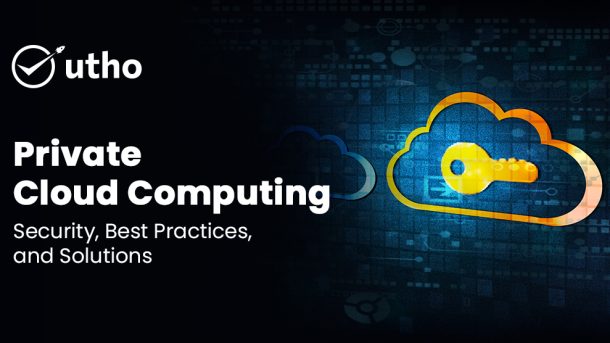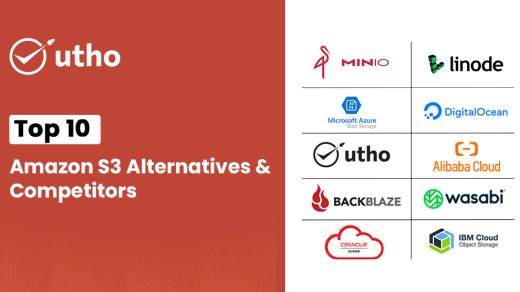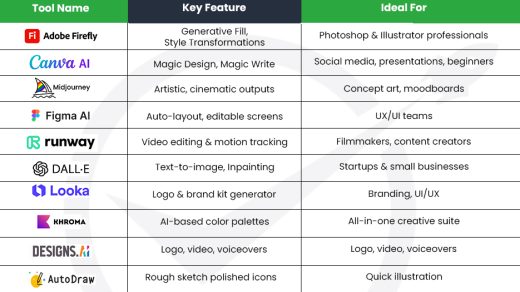Businesses worldwide are using cloud solutions more and more. They do this regardless of size, to meet their computing needs. The best choice for fast and cheap IT services is the private cloud model. Organizations looking for better security prefer it.
Initially hesitant, private cloud computing quickly became the most secure cloud choice.
Learn more about private cloud computing and best practices in this blog.
What is a Private Cloud?
A private cloud is a dedicated cloud computing model exclusively used by one organization, providing secure access to hardware and software resources.
Private clouds combine cloud benefits—like on-demand scalability and self-service—with the control and customization of on-premises infrastructure. Organizations can host their private cloud on-site, in a third-party data center, or on infrastructure from public cloud providers like AWS, Google Cloud, Microsoft Azure, Utho. Management can be handled internally or outsourced.
Industries with strict regulations, such as manufacturing, energy, and healthcare, prefer private clouds for compliance. They are also suited for organizations managing sensitive data like intellectual property, medical records, or financial information.
Leading cloud providers and tech firms like VMware and Red Hat offer tailored private cloud solutions to meet various organizational needs and regulatory standards.
How Does a Private Cloud Work?
To understand how a private cloud works, one must start with virtualization, which is at the heart of cloud computing. Virtualization means creating virtual versions of operating systems. They are for storage devices, servers, or network resources in a cloud. This technology helps IT departments achieve greater efficiency and scalability.
A private cloud server is secure and isolated. It uses virtualization to pool the resources of many servers. Public clouds are available to everyone. In contrast, private clouds are limited to specific organizations. This ensures that these groups have exclusive access to their cloud resources. They also remain isolated from others. It is usually rented monthly.
Managing private cloud environments varies. It depends on whether the servers are hosted locally or in a data center from a cloud provider.
Types of Private Clouds
Private clouds differ in terms of infrastructure, hosting and management methods to meet different business needs:
Hosted Private Cloud
In a hosted private cloud, dedicated servers are used only by one organization and are not used or shared with others. The service provider sets up the network and takes care of hardware and software updates and maintenance.
Managed Private Cloud
Managed Private Cloud includes full control of the service provider. This option is ideal for organizations that do not have the in-house expertise to control their private cloud infrastructure. The service provider manages all aspects of the cloud environment.
Software-only private cloud
In a software-only private cloud, the provider supplies the software. This software is needed to run the cloud. The organization owns and manages the hardware. It is suitable for virtualized environments where the hardware is already ready.
Software and Hardware Private Cloud
Service providers offer private clouds that combine both hardware and software. Organizations can manage it internally. Or, they can choose third-party management services. These services offer flexibility to match their needs.
These private clouds let businesses set up their infrastructure to fit their preferences. They can adjust it for how it operates, how it scales, and how it manages resources.
Simplified Private Cloud Service Models
All three cloud models support these key cloud services:
Infrastructure-as-a-Service (IaaS)
It provides on-demand computing, networking, and storage over the Internet. You pay for what you use. IaaS allows organizations to scale their resources. This reduces the initial capital costs of traditional IT.
Platform-as-a-Service (PaaS)
It provides a full cloud platform. This includes hardware, software, and infrastructure. The platform is for developing, operating, and managing applications. PaaS removes the complexity of building and maintaining such platforms on-premises. This increases flexibility and cuts costs.
Software-as-a-Service (SaaS)
Lets users access and use cloud apps from a vendor, for example Zoom, Adobe, or Salesforce. The provider manages and maintains both the software and the underlying infrastructure. SaaS is widely used due to its convenience and accessibility.
Serverless computing
It lets developers build and run cloud apps. They do this without setting up or managing servers or back-end systems. Serverless simplifies development. It supports DevOps. It speeds up deployment by cutting infrastructure tasks.
These cloud service models let organizations choose their level of abstraction and control. They can choose from core infrastructure to fully managed applications. This increases their flexibility and efficiency.
Key Components of a Private Cloud Architecture
A private cloud architecture contains several key components that together support its operation.
Virtualization layer
The core of the private cloud architecture is the virtualization layer. This part lets you make and manage virtual machines (VMs). It does this in a private cloud. Virtualization optimizes the use of resources and enables flexible allocation of computing power.
Management Layer
The Management Layer provides the tools and software. They are needed to watch and control private cloud resources. It ensures efficient management of virtual machines, storage, and network components. This layer also supports automation and instrumentation to make tasks easier.
Storage Layer
Data management is critical. The storage layer of a private cloud architecture handles storage. It also handles data copying and backup. It ensures data integrity, availability, and scalability in a private cloud infrastructure.
Network layer
The network layer helps connect different parts. It allows efficient communication in a private cloud. This includes switches, routers, and virtual networks. They support data transfer and connections between virtual machines and other resources.
Security Layer
Protecting sensitive data and resources is paramount in a private cloud architecture. The security layer implements strong measures such as authentication, encryption, and access control. It keeps unauthorized access, data breaches, and other security threats at bay.
Software Defined Infrastructure (SDI)
SDI plays a key role. It isolates the hardware. It enables managing infrastructure with software. It automates resource provisioning, configuration, and service scaling in a private cloud. SDI increases agility and flexibility by reducing manual intervention.
Automation and orchestration
Automation and orchestration improve workflows in a private cloud architecture. Automation eliminates manual tasks. It does this by automating routine tasks, such as VM deployment and setup. Orchestration coordinates complex processes between multiple components, ensuring seamless integration and efficiency.
These parts work together. They form a sustainable and efficient private cloud. They allow organizations to use cloud services. They do this while keeping control over their resources and ensuring strong security.
Industries that benefit from private cloud architecture
Private cloud architecture offers big benefits in many industries. It gives better data security, flexibility, and efficiency. These benefits are tailored to the needs of a specific sector.
Healthcare
Private cloud architecture is vital to healthcare. It has strong security to protect patient data. This allows healthcare organizations to keep control of data. They do this through strict access controls, encryption, and compliance with rules. Private clouds also work well with existing systems. They help digital transformation and protect patient privacy.
Finance and Banking
In finance and banking, private cloud architecture ensures top data security. It also ensures regulatory compliance. This allows institutions to keep sensitive customer data in their own systems. It minimizes the risks of data breaches. Private clouds offer scalability. They also have operational efficiency and high availability. These traits are essential for keeping customer trust and reliability.
Government
Governments benefit from private cloud architecture by improving information security and management. Private clouds are used in government infrastructures. They ensure data independence and enable rapid scaling to meet changing needs. They use resources well and cut costs. This lets governments improve service and productivity. They also comply with strict data protection laws.
Education
Private cloud architecture supports the education sector with advanced data security and scalability. Schools can store and manage sensitive data. They do so in a way that is secure. This ensures that students and staff can access it and rely on it. Scalability lets schools expand digital resources. It helps them support online learning well. This promotes flexible and collaborative education.
Production
In production, a private cloud stores and processes data. It provides a secure environment. This ensures privacy law compliance. It also makes it easy to track activity through centralized management. Private clouds offer scalability and disaster recovery. They reduce the risk of downtime and improve the use of IT resources. This boosts productivity and decision-making.
E-commerce and retail
Private cloud architecture is important for e-commerce and retail. It ensures the secure management of customer data. It supports reliable, flexible, and scalable functionality. This is needed to process online transactions and ensure compliance with regulations. Private clouds allow businesses to improve customer experience. They do this while keeping data integrity and operational efficiency.
In short, private cloud architecture is versatile. It works for many industries and meets their special needs. It does so with better security, scalability, and efficiency. By using these benefits, organizations can improve their operations. They can support digital change and meet strict regulations. These rules drive innovation and growth in their industry.
Private Cloud Use Cases
Here are six ways organizations use private clouds. They use them to drive digital transformation and create business value:
Privacy and Compliance
Private clouds are ideal for businesses with strict privacy and compliance requirements. For example, healthcare organizations follow HIPAA rules. They use private clouds to store and manage patient health data.
Private cloud storage
Industries such as finance use private cloud storage. They use it to protect sensitive data and control access. Access is limited to authorized parties. They use secure connections like virtual private networks (VPNs). This ensures it's data privacy and security.
Application modernization
Many organizations are modernizing legacy applications using private clouds tailored for sensitive workloads. This allows a secure switch to the cloud. It keeps data safe and follows rules.
Hybrid Multi-Cloud Strategy
Private clouds are key to hybrid multi-cloud strategies. They give organizations the flexibility to choose the best cloud for each workload. Banks can use private clouds for secure data storage. They can use public clouds for agile app development and testing.
Edge Computing
Private cloud infrastructure supports edge computing by decentralizing computing closer to its creation. This is crucial for applications like remote patient monitoring in healthcare. You can process sensitive data locally. This ensures fast decision-making while following data protection rules.
Generative AI
Private clouds use generative artificial intelligence to improve security and operational efficiency. For example, AI models analyze old data from private clouds. They use it to find and respond to new threats. This strengthens overall security.
These use cases highlight how private clouds help organizations across industries. They use them to innovate, meet regulations, and improve security. They do this by using the benefits of cloud computing.
Future Trends and Innovations in Private Cloud Architecture
Private cloud architecture is changing. This is due to new trends and innovations. They improve performance, security, and scalability in all industries.
Edge Computing and Distributed Private Clouds
Edge Computing is an important trend in private cloud architecture. It brings computing closer to data sources. Organizations can reduce latency. They can do this by spreading cloud resources across many edges. This will also increase data throughput. This approach supports real-time applications in the Internet of Things. It also helps smart cities and autonomous vehicles. It does this while improving data security through local processing.
Storage and Microservices
Storage and Microservices are revolutionizing application deployment and management in private cloud environments. Containers provide a light, separate environment for applications. They allow fast deployment, scaling, and migration in the cloud. Microservice architecture increases flexibility. It does this by dividing applications into smaller, independent services. Teams develop and scale services as separate projects. This approach promotes efficient use of resources. It also allows seamless integration with the private cloud. And it supports flexible development practices.
Artificial Intelligence and Machine Learning in Private Clouds
AI and ML are driving innovation in private cloud design. They enable smart automation and predictive analytics. These technologies optimize resource allocation, strengthen security measures, and improve infrastructure performance. Private clouds use AI algorithms. They analyze large data sets to find valuable insights. This improves work efficiency and user experience. AI and ML help with cost optimization and anomaly detection. They let organizations use data for decisions and boost productivity.
In conclusion, private cloud architecture keeps evolving. It does so with advanced technologies. They give organizations more flexibility, control, and security. These innovations address many industry needs. They include edge computing for real-time processing. They also cover efficient application management with containers and microservices. Private clouds integrate AI and ML. They use them for proactive resource management and infrastructure maintenance. This ensures growth and competitiveness in the digital age.
Top Private Cloud Providers
Here are some top private Cloud providers:
Amazon Virtual Private Cloud (VPC)
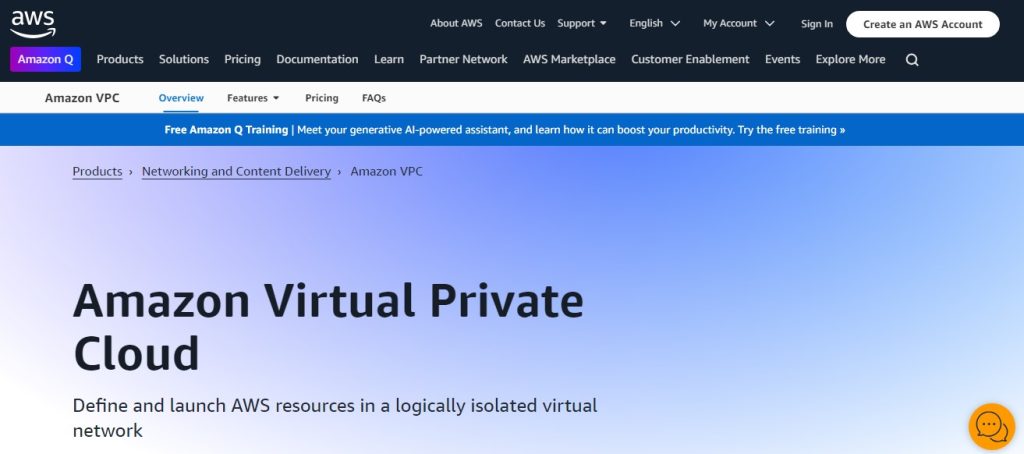
Amazon VPC is a dedicated virtual network in AWS accounts. It allows you to run private EC2 instances. It offers optional features by the slice. But, there is no extra cost for the VPC itself.
Hewlett Packard Enterprise (HPE)
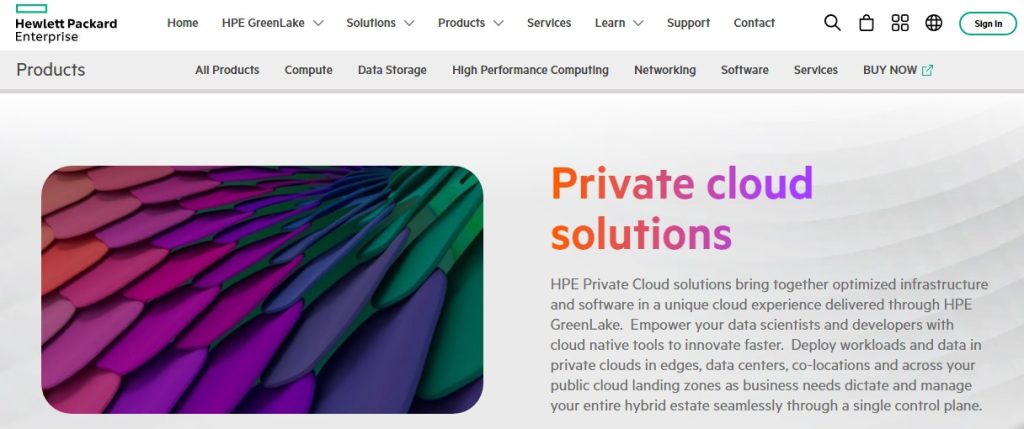
HPE provides software-based private cloud solutions. They let organizations scale workloads and services. This scaling reduces infrastructure costs and complexity.
VMware

VMware offers many private cloud solutions. These include managed private cloud, hosted private cloud, and virtual private cloud. Their solutions use virtual machines and application-specific networking for the data center architecture.
IBM Cloud
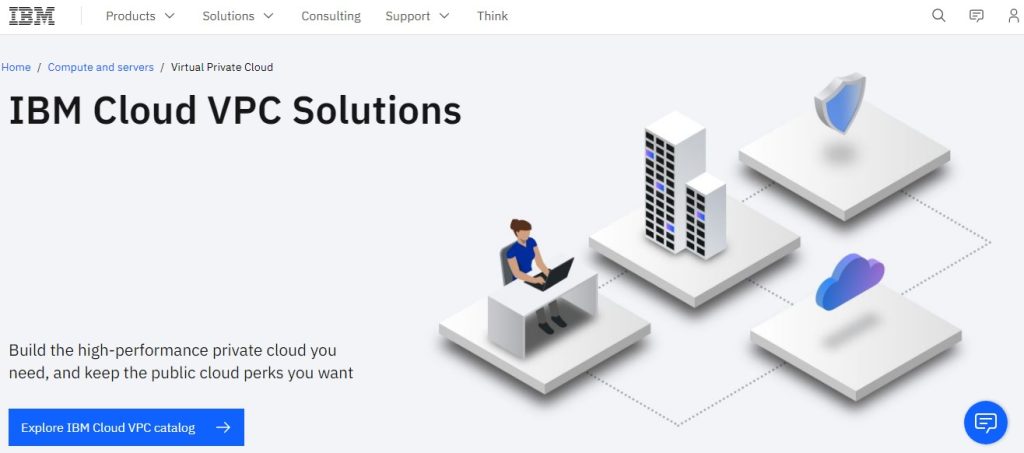
IBM offers several private cloud solutions. These include IBM Cloud Pak System and IBM Cloud Private. They also include IBM Storage and Cloud Orchestrator. They are for the varying needs of businesses.
These vendors offer strong private cloud architectures. The architectures are tailored to improve security, scalability, and efficiency. They are for organizations across industries.
Utho
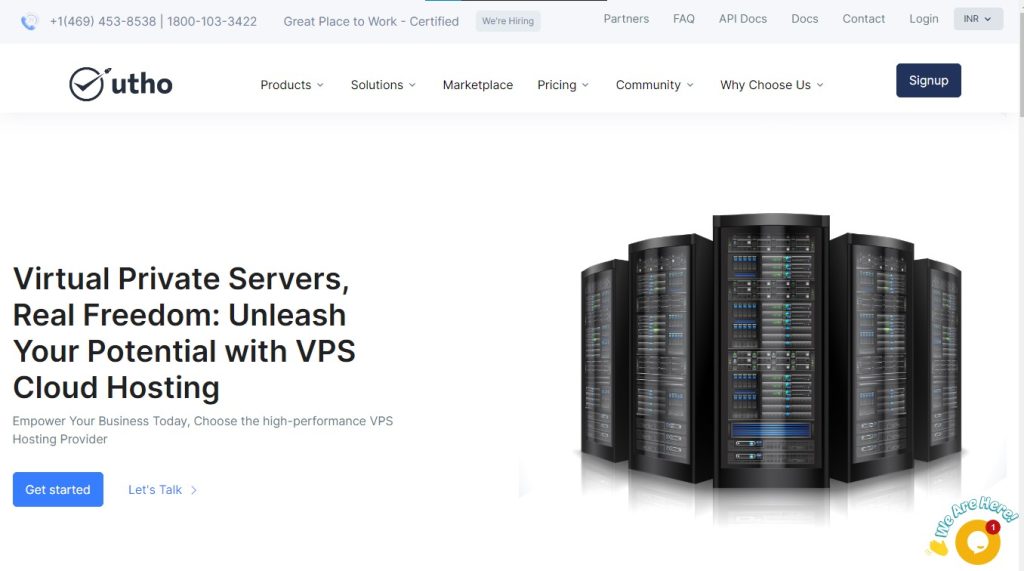
Investing in a private cloud can be expensive and is often burdened by high service fees from industry service providers. We offer private cloud solutions that can reduce your costs by 40-50%. Utho platform also supports hybrid setups. We connect private and public clouds seamlessly. What makes Utho unique is its intuitive dashboard. It is designed to simplify infrastructure management. Utho lets you watch your private cloud and hybrid setups well. You can do this without the high costs of other providers. It’s an affordable, customizable and user-friendly cloud solution.
How Utho Solutions Can Assist You with Cloud Migration and Integration Services
Adopting a private cloud offers tremendous opportunities, but a well-thought-out strategy is essential to maximize its benefits. Organizations must evaluate their business processes. They need to find the best private cloud solution. This will help them grow faster, foster innovation, and do better in a tough market.
Utho offers many private cloud services tailored to your needs. It offers flexible resources, including extra computing power for peak needs.
Contact us today to learn how we can support your cloud journey. You can achieve big savings of up to 60% with our fast solutions. Simplify your operations with instant scalability. The pricing is transparent and has no hidden fees. The service has unmatched speed and reliability. It also has leading security and seamless integration. Plus, it comes with dedicated support for migration.

